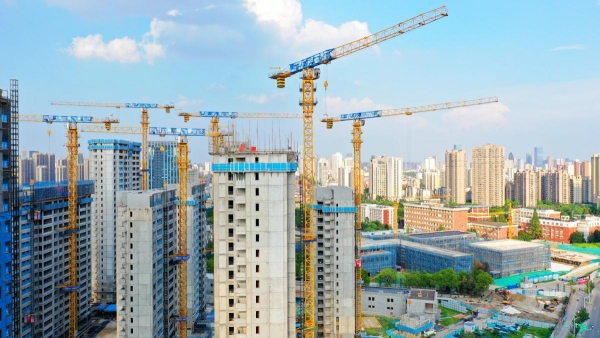Realty draws hope from data

A residential property project is under construction in Hefei, Anhui province. CHEN SANHU/FOR CHINA DAILY
Despite continued adjustments, positive signs have emerged in China's housing market, thanks to the supportive measures from both central and local governments. And further efforts are needed to form a stable and healthy property market, said officials and experts on Thursday after digesting July data from the National Bureau of Statistics.
Declines in some key real estate indicators continued to narrow as a series of policies introduced in the past few months took effect, said Liu Aihua, an NBS spokeswoman, at a State Council Information Office news conference in Beijing on Thursday.
Sales by floor area of new commercial housing — flats, apartments, condominiums and the like, as against public housing like municipal housing — fell 18.6 percent year-on-year to 541.49 million square meters in the January-July period, compared with a 19 percent slump in the January-June period, according to NBS data.
"Most of the real estate indicators remain in downtrend, showing the real estate market is still in the process of adjustments," said Liu.
The sector is required to implement the new measures well, aim to promote the stable and healthy development of the property market, digest the existing inventories, optimize the newly developed properties, actively support the acquisition of existing commercial housing for government-subsidized housing, ensure the delivery of residential properties and build the new real estate development pattern at an accelerated pace, Liu said.
Shanghai came up with a good performance in the housing market as home prices of both new and existing properties registered positive growth month-on-month, according to NBS data.
New home prices edged up 0.2 percent in July from a month earlier, while the nation's four first-tier cities — Beijing, Shanghai, and Guangzhou and Shenzhen in Guangdong province — saw their new home prices fall 0.5 percent from June on average.
In Shanghai, pre-owned home prices edged up 0.1 percent month-on-month, against an average decline of 0.5 percent in China's top-tier cities.
"Shanghai's stronger supportive policies and its comprehensive capability in sustaining demand have contributed to resilience in home prices," said Zhang Dawei, chief analyst at Centaline Property Agency.
Yan Yuejin, vice-president of the Shanghai E-House China Research and Development Institute, said, "The strong fundamentals, along with the city's ease in homebuying policies, have released potential demand."
Fewer Chinese cities reported new home price rises in July compared to June, suggesting a need for various Chinese cities to explore new demand, said Yan.
"The July data also indicated that the home price index staged a mild improvement month-on-month, which indicated the effectiveness of our supportive policies in lowering homebuying costs and activating demand.
"With regard to the extended year-on-year decline, we expect more follow-up measures to better facilitate and explore demand in various segments of the housing market."
First-tier cities, Yan said, play an important role in driving the nation's housing market in the right direction.





 play
play